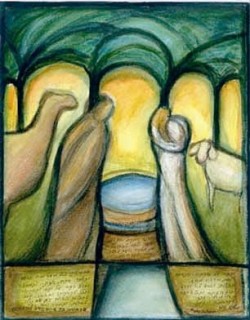
|
Abraham ordered Isaac to take a wife among the daughters of Laban, his mother’s brother. So he sent his servant (Eliezer) on the mission to bring back a wife. The servant of Abraham prayed, the girl, I ask to give me a drink of water. If she then offers to also draw water for all my camels that they can have a drink. Let her be the one who will become the wife of Isaac. Rebekah must have drawn a lot of water because camels drink a lot of water after they have been on a long journey. Later Rebekah agreed to go back with the servant and become the wife of Isaac. |
אברהם נתן הורה ליצחק לקחת אישה מבנות לבן, אחי אמו. על כן הוא שלח את משרתו אליעזר במשימה להביא אישה לבנו. אליעזר, עבד אברהם התפלל שהנערה אשר ביקשה להשקותו מים תציע לשאוב מים ולהשקות את כל גמליו, תהיה זו אשר תינשא ליצחק. רבקה נדרשה לשאוב הרבה מים כי הגמלים שותים הרבה לאחר משא ארוך. מאוחר יותר רבקה הסכימה לחזור עם אליעזר עבד אברהם להיות אישה ליצחק. |
Background Reading:RebekahAnd it came to pass, before he had done speaking, that, behold, Rebekah came out, who was born to Bethuel, son of Milcah, the wife of Nahor, Abraham’s brother, with her pitcher upon her shoulder. And the damsel was very fair to look upon, a virgin, neither had any man known her: and she went down to the well, and filled her pitcher, and came up. And the servant ran to meet her, and said, Let me, I pray thee, drink a little water of thy pitcher. And she said, Drink, my lord: and she hasted, and let down her pitcher upon her hand, and gave him drink. And when she had done giving him drink, she said, I will draw water for thy camels also, until they have done drinking. And she hasted, and emptied her pitcher into the trough, and ran again unto the well to draw water, and drew for all his camels. |
קריאת רקע:רבקהוַיְהִי-הוּא, טֶרֶם כִּלָּה לְדַבֵּר, וְהִנֵּה רִבְקָה יֹצֵאת אֲשֶׁר יֻלְּדָה לִבְתוּאֵל בֶּן-מִלְכָּה, אֵשֶׁת נָחוֹר אֲחִי אַבְרָהָם; וְכַדָּהּ, עַל-שִׁכְמָהּ. וְהַנַּעֲרָ, טֹבַת מַרְאֶה מְאֹד–בְּתוּלָה, וְאִישׁ לֹא יְדָעָהּ; וַתֵּרֶד הָעַיְנָה, וַתְּמַלֵּא כַדָּהּ וַתָּעַל. וַיָּרָץ הָעֶבֶד, לִקְרָאתָהּ; וַיֹּאמֶר, הַגְמִיאִינִי נָא מְעַט-מַיִם מִכַּדֵּךְ. וַתֹּאמֶר, שְׁתֵה אֲדֹנִי; וַתְּמַהֵר, וַתֹּרֶד כַּדָּהּ עַל-יָדָהּ–וַתַּשְׁקֵהוּ. וַתְּכַל, לְהַשְׁקֹתוֹ; וַתֹּאמֶר, גַּם לִגְמַלֶּיךָ אֶשְׁאָב, עַד אִם-כִּלּוּ, לִשְׁתֹּת. וַתְּמַהֵר, וַתְּעַר כַּדָּהּ אֶל-הַשֹּׁקֶת, וַתָּרָץ עוֹד אֶל-הַבְּאֵר, לִשְׁאֹב; וַתִּשְׁאַב, לְכָל-גְּמַלָּיו. |
:מודולים אחרים ביחידה זו
- genesis-02-07 – בְּרֵאשִׁית ב, ז
- Genesis 2:21-23 – בְּרֵאשִׁית ב, כא-כג
- Genesis 2:24-25 – בְּרֵאשִׁית ב, כד-כה
- Genesis 3:1-4 – בְּרֵאשִׁית ג, א-ד
- Genesis 3:11-14 – בְּרֵאשִׁית ג, יא-יד
- Genesis 3:16-19 – בְּרֵאשִׁית ג, טז-יט
- Genesis 3:23-24 – בְּרֵאשִׁית ג, כג-כד
- Cain kills Abel because of jealousy, Genesis 4:2-8 – בגלל קינאה קין רצח את הבל. בראשית ד: ב-ח
- Genesis 9:16-20 – -בְּרֵאשִׁית ט, טז
- Genesis 11:1-9 – בְּרֵאשִׁית יא, ב-ט
- Genesis 16:1-4 – בְּרֵאשִׁית טז, א-ד
- Genesis 18:9-12 – בְּרֵאשִׁית יח, ט-יב
- Genesis 19:23-26 – בְּרֵאשִׁית יט, כג-כו
- Genesis 19:30-33 – בְּרֵאשִׁית יט, ל-לג
- Genesis 21:14 – בְּרֵאשִׁית כא, יד
- Genesis 22:9-10 – בְּרֵאשִׁית כב, ט-י
- Genesis 24:15-20 – בְּרֵאשִׁית כד, טו-כ
- Genesis 25:23-26 – בְּרֵאשִׁית כד, כג-כו
- Genesis 27:21-22 – בְּרֵאשִׁית כז, כא-כב
- Genesis 29:9-11- בְּרֵאשִׁית כט, ט-יא
- Genesis 29:23-26 – בְּרֵאשִׁית כט, כג-כו
- Genesis 30:14-18 – בְּרֵאשִׁית׃ ל, יד-יח
- Genesis 31:4-7 – בְּרֵאשִׁית לא, ד-ז
- Genesis 34:25-26 – בְּרֵאשִׁית לד, כה-כו
- Genesis 35:16-19 – בְּרֵאשִׁית לה, טז-יט
- Genesis 37:31-32 – בְּרֵאשִׁית כו, לב-לג
- Genesis 37:32-33 – בְּרֵאשִׁית כו, לב-לג
- Judah and Tamar, Genesis 38:13-16 – הודה ותמר, בְּרֵאשִׁית לח, יג-טז
- Genesis 38:24-26 – בְּרֵאשִׁית לח, כה-כו
- Genesis 39:11-12 – בְּרֵאשִׁית לט, יא-יב
- Genesis 45:1-4 – בְּרֵאשִׁית מה, א ד
- Genesis 50:13-14 – בְּרֵאשִׁית נ, יג-יד
- Death of Joseph, Genesis 50:24-26 – מות יוסף, בְּרֵאשִׁית נ, כד-כו